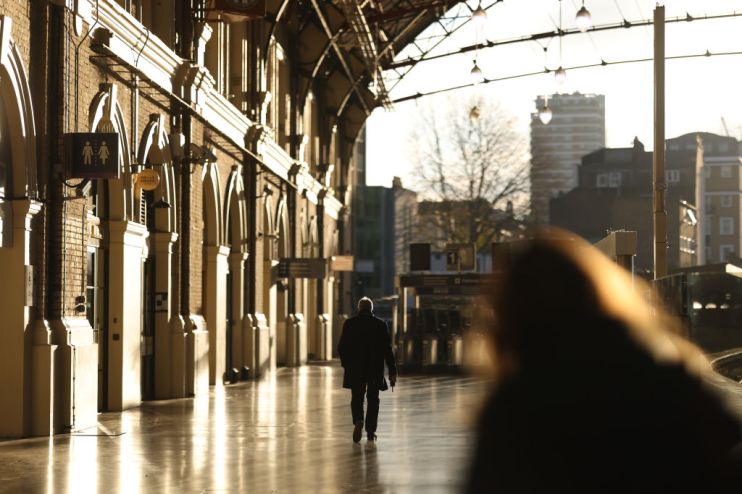‘Thousands of jobs at risk’: Bar bosses despair over fresh Christmas rail strikes

Pub and bar bosses were last night left despairing over a slew of fresh strike dates, which fall over Christmas.
Rail union RMT announced three more days of walk-outs on Monday night, with workers set to strike from 6pm on Christmas Eve to 6am on 27 December.
Industrial action had already been planned on 13, 14, 16, 17 December and 3, 4, 6, 7 January.
Hospitality chiefs have already urged all parties to hash out a last-minute resolution and avoid walk-outs over the industry’s busiest trading period.
Nightcap CEO Sarah Willingham, who owns the Cocktail Club, Barrio and The Adventure Bar group bar chains, dubbed RMT boss Mick Lynch an “absolute disgrace” last night.
She said businesses would close and thousands of people would lose their jobs as a result of the action, describing the economic impact as “unimaginable.”
The government should provide additional support to the hospitality sector in order to get it through “what will be a very bleak winter without the benefit of the golden month of trade,” UKHospitality chief Kate Nicholls said last night.
The walkouts will cost the hospitality industry £1.5bn in lost sales, according to UKHospitality.
The additional action would be “the death knell” for many night time economy businesses, Michael Kill, boss of the Night Time Industries Association, said.
Thousands of bookings were being cancelled as venues scrambled to bring bookings forward to dodge strike days, resulting in “further chaos,” Kill said.
It was “unacceptable” that unions and rail companies had failed to reach a resolution, he added.
London restaurants warned they will haemorrhage sales should planned action go ahead this month, sharing their fears with CityA.M. yesterday, prior to the additional dates being announced.
Searcys champagne bar and restaurant chain, which has venues at the Gherkin and St Pancras International station, said it was worried it would take a 30 per cent hit to its revenue this month.
Hospitality businesses in the capital have been gearing up for their first Christmas void of Covid restrictions in three years.
On Sunday evening, railway worker union RMT yesterday rejected an eight per cent pay increase offer, arguing it didn’t meet “any of our criteria” on job security, pay, and working conditions.
RMT has now put Network Rail’s offer to its members with the recommendation to reject it.
Union boss Mick Lynch said the RMT had been compelled to add extra dates “due to the continuing intransigence of the employers.”
“We remain available for talks in order to resolve these issues but we will not bow to pressure from the employers and the government to the detriment of our members,” Lynch said.
The slew of walk-outs “couldn’t come at a worse time for the hospitality industry,” according to the founders of house party-inspired bar and restaurant concept The Little Door & Co.
The firm’s four London venues had seen “multiple cancellations”, making “a bleak three years” for the sector now, founder Kamran Dehdashti, told CityA.M.
Jamie Hazeelsaid, who also runs the chain, said not enough attention was being given to “the vast knock on effects” of the strikes on the industry.
“We are losing significant revenue on our key trading period of the year – not to mention the difficulty of staffing the venues for those who can come,” Hazeelsaid added.
Rail unions were “only looking out for themselves,” while “people’s jobs are at risk”, the CEO of West End landlord Shaftesbury told CityA.M. last week.
If West End firms were not able to reap the rewards of the Christmas shopping period next month, that trade will be “lost and gone forever,” Brian Bickell said.
It comes as city centres face a “downbeat” start to next year, as cash-strapped Brits pull back from discretionary spending after Christmas, he added.
Previously, Lynch has told hospitality businesses to direct their anger at rail operators for the upcoming rail strikes.
In a letter to hospitality and retail associations, Lynch said that while “you face disruption to your business at this critical time, the private rail businesses we are in dispute with will not lose a penny.”
The union said the government has indemnified railway companies, sparing them “from being liable for any loss of revenue arising from the strikes.”
According to Lynch, ministers have bailed operators out of strikes for a total of £318m, not giving companies any incentive to settle the disputes.
“As it is the government which is clearly prolonging this dispute with their taxpayer funded bailout for the private train companies you would clearly be justified in asking what similar steps it will be taking to compensate your businesses,” Lynch wrote.